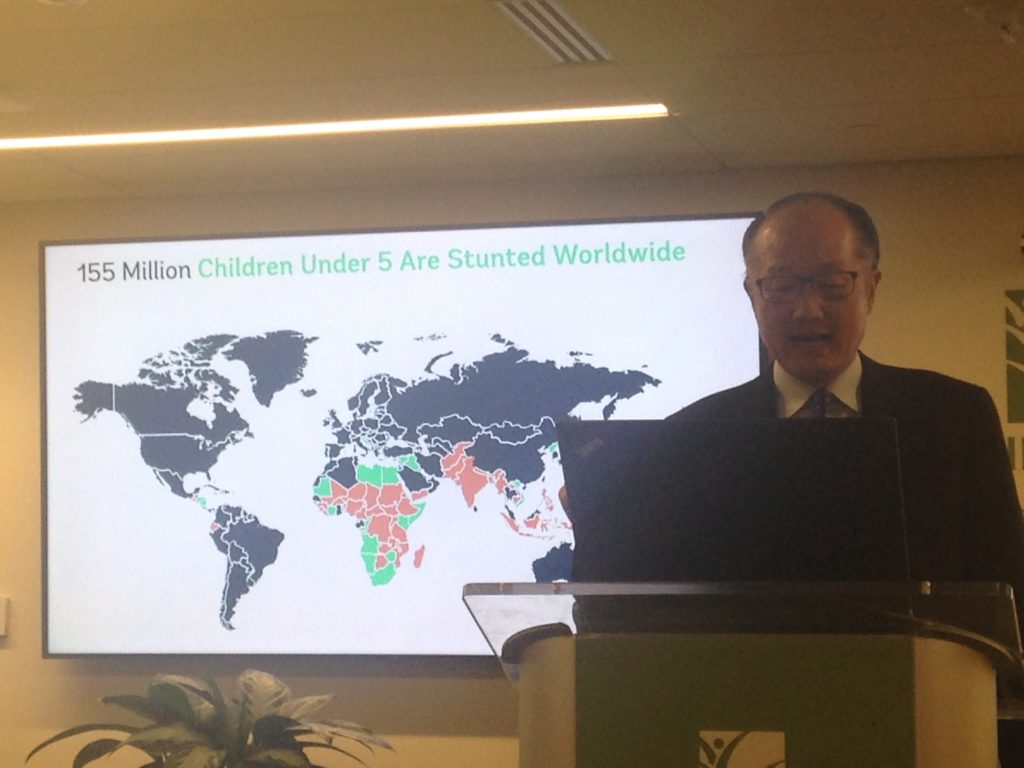Branding Human Capital
April 12, 2021 africa / agribusiness / Agriculture / AI / artificial intelligence / Asia / Business / developed / developing countries / Development / Education / entrepreneurship / human capital / innovation / investment / Jobs / machine learning / population / stunted population / technology / Western World
Always thankful to be among thinkers, policy makers, influencers and decision makers, and on Wednesday December 6th, 2017 at the 27th Annual Martin J Forman Lecture series held at one of the Think Tanks in Washington DC, the President of the World Bank Group Jim Yong Kim was the keynote speaker as the podium has been graced by the likes of the 25th Lecturer Rajiv Shah, then the Senior Advisor at the Chicago Council on Global Affairs and now the President of the Rockfeller Foundation. After attending these series I have learnt that the lecture series was established in honor of Martin J Forman who is a recognized pioneer in nutrition and has been commended as an evidence-based development worker who also dedicated his life heading the Office of Nutrition at USAID for more than 20 years.
I must say that you rarely see participants remaining in their seats until the end of a lecture even less for the Q&A and do you seldom experience a lecture that engages with humor as well as substance. The President of the WBG delivered a thought-provoking lecture that aligns with what I have been working on in my own microbial way. The presentation began with President Kim giving us a sneak peak of his journey to the pinnacle of an organization he once protested against- the World Bank. While sharing in a room full of policy wonks, development professionals and thought leaders, President Kim recognized Alan Berg the author of “The Nutrition Factor” and development hero, who had tremendous impact on President Kim’s professional life. Mr. Berg humbly seated in the front row further out from the podium smiled and remained in his seat. Continuing with his tantalizing presentation, he announced a new factor in the WBG assessment of the wealth of nations. I was elated to be in the room when President Kim announced that Human Capital would be a factor in the measurement of a country’s ease of doing business ranking. As I have been exclaiming in my own environment the importance of the Human factor, it is about time that the WBG includes Human capital in the assessment of the wealth of nations. Eventhough Produced and Natural capital have been the indicators of wealth and growth, adding Human capital to the equation advances a pivotal marking system for countries’ global ranking. Human capital will be given the same importance as the two factors of country rankings measurement – Produced capital which largely counts infrastructure including electricity and roads; and Natural capital that mainly focuses on encouraging and incentivizing country leadership to value their natural resources as it indicates the wealth of a country. President Kim’s lecture addressed Human capital from a nutritional angle given that it determines nations’ health and countries’ wealth, and he highlighted the importance of realistic goals with evidence-based outcomes. He implores countries to focus on sustainable growth and stability that directly impacts people. He also emphasized that nutrition is a precursor of a nation’s well-being, and the well-being of a country is dependent on the nation’s health, which starts with the well-being of children.
Nutrition is a precursor of a nation’s well-being

Picture taken by participant: Rahel G
The infamous Senior Director of the World Bank’s Food and Agriculture Global Practice, Juergen Voegele exclaimed that the world spends half a trillion dollars per year to support its farming system globally where 80-90% of the money has been invested in poor outcomes such as lack of sustainable agricultural yields, deficient nutritional outputs and destruction of the environment. It is also reported Africa has sixty percent of the world arable land with half of the continent’s population being under 34 years old and 20% likely to be disabled. The paradox is that 75 percent of the world’s poorest people live in rural areas and depend on agriculture and related activities for their livelihood yet 50 percent of hungry people are farming families. The Hunger Project reports that ” globally, 155 million children under 5 still suffer from stunting”. In 2016, about two out of every four stunted children lived in South Asia and one in three in sub-Saharan Africa. In addition to an ever-increasing number of stunted children mainly due to the challenges of malnutrition, Africa’s commitment to agriculture is not only due to the growing demand but also due the 2014 AU Heads of State Malabo Declaration on Accelerated Agricultural Growth and Transformation for Shared Prosperity and Improved Livelihoods which is a commitment to end huger by 2025 and under the Feed the Future Initiative, the objective is to achieve this reduction by 50% of the current levels of post-harvest losses. It is vital to address food security given that by 2030 the population growth rate of sub-Saharan Africa is projected to grow at 2.1% annually yet Africa is currently producing less food per person, with the average plot of land being too small to feed a family. As nation’s well-being indicates country’s wealth, it is evident that for a country to prosper it has to invest in its people starting with nourishing its children. As the Former President of South Africa, Nelson Mandela said “There can be no keener revelation of a society’s soul than the way in which it treats its children.”
Well-being of a country is dependent on the nation’s health
For some of us who keep our eyes and ears on the pulse of the future including market trends, we know the peril of jobs and the reality of what use to be known as the future which is actually now. As it was covered during the IMF Annual meeting in 2017, President Kim echoed the forthcoming challenges of country adaptation not only to climate change but also to the fourth industrial era where Artificial Intelligence will take over jobs making 65% of existing jobs in India and 85% of current jobs in Ethiopia disappear. Developing countries are disillusioned to address development needs by taking the same path that South Korea and other countries took at the start of the globalization race, which had Third world countries ( definition varies) at the same level in the 1960’s. The redundant question of “why and how come?” can only be attributable to the fact that countries such as South Korea and Singapore have invested in human capital. As expressed by President Kim who is born in Korea, Korea in the 1950’s was unable to receive a loan from the World Bank and by 1963 when it received its first one, it build a road and the second loan ever received was for education. When the majority of the countries in Africa alike in Asia spent less than 2% of their GDP on education or health, it only showcases the weakened nation building efforts. In some cases, country leadership complacency is demonstrated by constantly waiting for the International donors reaction to mobilize the required funds for containment and possibly elimination of the root causes. There are exceptions to the rule and that is only attributable to the leadership willingness to preserve the nation’s dignity. A great example is President Paul Kagame of the Republic of Rwanda who has made his country one shining star to be sited at every Development conference and gathering. One example among many achievements, Rwanda’s dramatic improvement in healthcare delivery and health outcomes led to the life expectancy rise by 10 years in the last decade. It is incredible to know that over 90% of Rwandans have access to medical insurance. One of the founding fathers of the United States of America, Thomas Jefferson stated ” Our greatest happiness does not depend on the condition of life in which chance has placed us, but is always the result of a good conscience, good health, occupation, and freedom in all just pursuits.”
The Children, our next generation
At least 12 of the 17 Sustainable Development Goals contain indicators that are highly relevant for nutrition, reflecting nutrition’s central role in sustainable development because preventing malnutrition delivers $16 in returns on investment for every $1 spent. The lecture was a presentation on the importance of the current generation actions which will impact the harvest of the next generation. As in the case of Africa where it is projected to be the World’s most populous region with a youthful population, Africa’s leadership both in the Private sector and Government must demonstrate transformational development that align with the 4th Industrial era. Unlike the past that was based on maximizing labor productivity with mechanization, this era is one that is based on information, innovation and technology.

Image from the web
Since the financiers such as the World Bank Group had not emphasized on human capital until the deployment of robots such as Sophia, the Saudi citizen that has already greater value than an African life, thinking that African leadership will be similar to the Tiger economies, similar leadership commitment has proven to be a mirage despite Africa’s collective resilience. Given the era’s direct impact on human kind, it is commendable for institutions such as the WBG to incentivize leadership across the globe to take into consideration the human factor in the design of what is to be created as the SMART World.
Here we are at the door step of 2018, three years since companies officially redefined human kind and when computers/machines intelligence were proclaimed to be built indistinguishable humanoids as expressed by the likes of Eric Schmidt, CEO of Google. Capital has been invested to deploy AI across the globe as we are marching towards a global war for water, food and jobs as these are major indicators of a nation’s gross national wellbeing. The deplete of natural resources in addition to the influx of Mankind has ignited intense conflicts that some claim the “survival of the fittest” has commenced along with an overheating earth. Countries success will be measured by the amount of investment it injects in nation building and management, on how it leverages its resources to create resilient and smart cities that enable human efficiency and increase collective productivity, and lastly, on what strategies it implements for human development. It is now time for collective reflection about human kind integration with Mind/machine learning as it may threaten our uniquely designed identity’s survival and prosperity. For the WBG rankings to take account Human capital as it is the energy that every country has sourced to build and grow demonstrates the coming of a new era whereby every country on this planet (195 countries) will have to determine the best ecosystems to create for their interconnected nations. As Internet of Things deployment increases this expected cycle of augmented collective productivity, our responsibility towards the children birthed become vital. As exclaimed by John F. Kennedy, the 35th President of the United States “Children are the living messages we send to a time we will not see.”
Do you agree that the success of a country is evidently linked to its nation’s well-being?
First published on brandmoiahora.com
« 11 years in Cross-Cultural Branding
